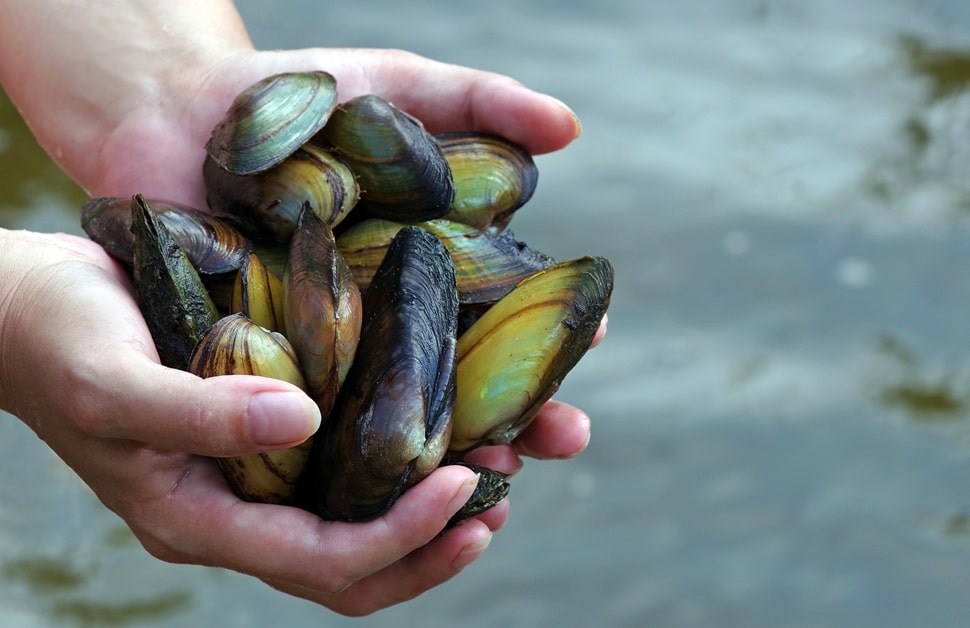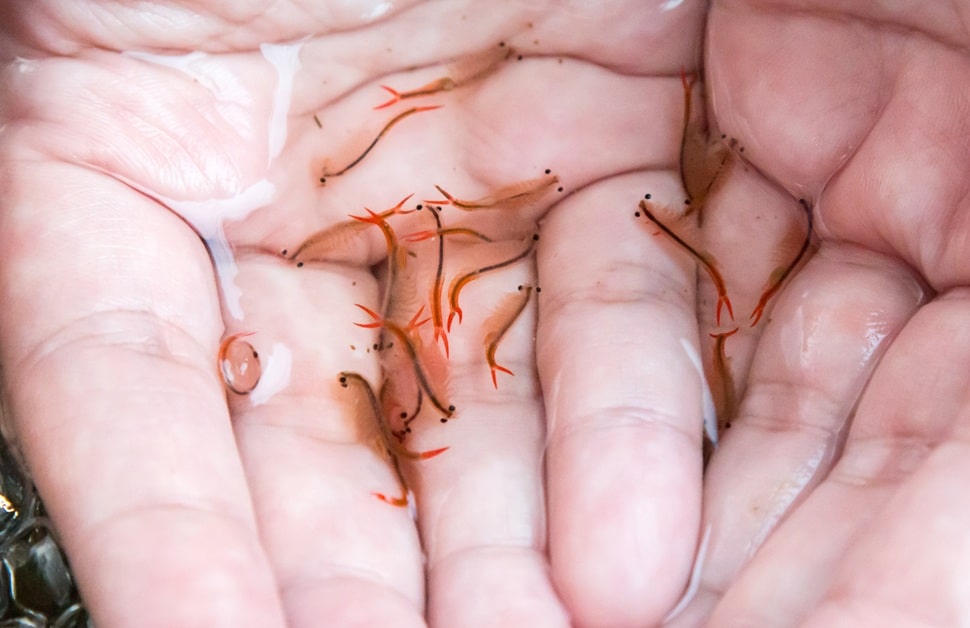
Surveys for Aquatic and Freshwater Invertebrates
For developers, landowners and utility companies, water quality is a critical issue, and regulations like the Water Framework Directive (WFD) make any projects near a pond, river or stream in need of assurances that the aquatic ecosystem won’t be affected.
Without the right sort of data, planning applications could be rejected by the local planning authorities. Environmental regulators will only be satisfied after they’ve seen evidence of a waterbody’s health.
A thorough assessment of a body of water needs to include testing for chemicals and analysing the life living within it. With an aquatic invertebrate survey, both factors are covered while meeting regulator requirements, tracking the impact of pollution and remaining compliant with UK law.
What is an Aquatic Invertebrate Survey?
An aquatic invertebrate survey is a specialist assessment used to measure the biological health of a watercourse, not only including a chemical water test, but also an investigation for various species that could be living in the water throughout different periods of the year.
Protected species inhabiting watercourses act as ‘bio-indicators’, and by collecting samples and identifying the wildlife present, ecological consultants can calculate a ‘biotic score’ to define a rating of the water’s quality.
All protected invertebrate species fall within an invertebrate survey, whereas an aquatic invertebrate survey focuses specifically on freshwater wildlife and follows a certain set of steps.
As well as being a standalone service, data from an assessment can support other ecology surveys, such as an ecological impact assessment (EcIA).
How Many Aquatic Invertebrate Species are in the UK?
Although there are thousands of aquatic invertebrate species in the UK, a certain group of them is granted full legal protection under Schedule 5 of the Wildlife and Countryside Act 1981, the Natural Environment and Rural Communities Act 2006, and the Habitats Regulations.
It is important to be aware of them, as finding them at any stage in the development process can halt work immediately.
Below is a complete list of both protected aquatic and semi-quatic invertebrates in the UK:
Crustaceans
- Fairy Shrimp (Anostraca)
- Lagoon Sand Shrimp (Gammarus insensibilis)
- Tadpole Shrimp (Triops longicaudatus)
- White-Clawed Crayfish (Austropotamobius pallipes)
Insects
- Lesser Silver Water Beetle (Hydrochara caraboides)
- Norfolk Hawker Dragonfly (Aeshna isoceles)
- Southern Damselfly (Coenagrion mercuriale)
- Spangled Water Beetle (Graphoderus zonatus)
Molluscs
- De Folin’s Lagoon Snail (Caecum armoricum)
- Freshwater Pearl Mussel (Margaritifera margaritifera)
- Glutinous Snail (Myxas glutinosa)
- Lagoon Sea Slug (Tenellia adspersa)
- Little Whirlpool Ram’s Horn Snail (Anisus vorticulus)
- Sandbowl Snail (Catinella arenaria)
Spiders
- Fen Raft Spider (Dolomedes plantarius)
Worms, Leeches and Anemones
- Ivell’s Sea Anemone (Edwardsia ivelli)
- Medicinal Leech (Hirudo medicinalis)
- Starlet Sea Anemone (Nematostella vectensis)
- Tentacled Lagoon Worm (Alkmaria romijni)
- Trembling Sea Mat (Victorella pavida)
Why Would Someone Need an Aquatic Invertebrate Survey?
If you’re building near a river or lake, the local planning authority, Natural England or the Environment Agency could ask for an aquatic invertebrate survey to establish a baseline for water quality, guaranteeing that the development complies with the WFD’s ‘no deterioration’ policy.
Alternatively, if there’s been a spill or you manage an outflow pipe, aquatic invertebrate surveys can be used to measure the impact on the environment, providing the scientific proof needed to confirm if a watercourse has been damaged. Organisations also use the surveys to track the success of river restoration projects, confirming if the improvements to the physical habitat actually go on to increase biodiversity.
Aquatic Invertebrate Survey Methodology
All of the survey work we provide is carried out according to strict Environment Agency standards, ISO guidelines and Natural England instructions. Above all else, accuracy is vital because the results can inform legal decisions and end up being a catalyst for whether or not a development can continue without penalties, delays or complete collapse.
With freshwater invertebrates, our ecologists are trained in standard sampling techniques and carry the necessary safety certificates for working in and around water. Industry-standard metrics we work with include the Average Score Per Taxon (ASPT), Biological Monitoring Working Party (BMWP), Community Conservation Index (CCI) and Whalley Hawkes Paisley Trigg (WHPT).
If you want to learn more details about the survey process, check out the section below:
Steps in the Site Inspection Process
1. Desk Study
Reviewing geological maps and existing records to understand the watercourse type and potential flow conditions.
2. Site Safety Assessment
Conducting a dynamic risk assessment of the site to ensure safe access to the river or pond bank.
3a. Kick-Sampling (Option 1)
For flowing water, using the standard three-minute kick-sampling technique.
The consultant disturbs the riverbed with their feet while holding a net downstream to catch the dislodged invertebrates, and vegetation is checked by hand.
3b. PSyM Sampling (Option 2)
For still water, using the predictive system for multimetrics (PSyM) method.
The consultant sweeps a net through the water for a set time to gather a representative sample.
4. Preservation
Preserving samples in alcohol on-site and labelling to maintain the chain of custody.
5. Laboratory Identification
Taking samples to a lab where experts identify the specimens under microscopes, often down to species-level.
6. Data Analysis and Reporting
Calculating the biotic scores and producing a comprehensive report detailing the water quality and the presence of any protected species.

Aquatic Invertebrate Surveys from the Team at Arbtech
For a lot of clients, adding an ecology survey to an already busy schedule can feel like an extra source of stress. Unfortunately, however, the decision to add an ecological assessment isn’t optional. And by arranging an aquatic invertebrate survey when you need one, you remove any chance of seeing costly and time-consuming delays in your development process.
Over the years, our team has worked with developers, engineers, water companies and more, helping to provide insight into ecological matters and planning considerations. We understand the deadlines all our clients are working towards, and we also know the importance of putting together a report that is clear, compliant and ready for submission.
It could be that you need a single baseline survey for a planning application, a report to help with long-term monitoring for a utility project or a different type of service entirely. Whatever the situation, speak to the helpful and knowledgeable team at Arbtech, and we will be able to consider your needs and requirements before delivering the right solution.
Contact Us Today for Quick and Effective Support
Instead of wasting time, money and effort, talk to our administration team and work out what you need to do to move your planning project forward. If you need an aquatic invertebrate survey, a terrestrial invertebrate survey or something else, we will be able to spot it straight away, price up the likely cost for the services you need, and get the survey work sorted for your site.
You can either fill out a quote form on our contact page, communicate with us over the phone or send us an email including all of your details. We can then go on to create a free quote for you to look over, and if you’re happy with it, confirm this with us and we will book in a date for us to begin researching your development site, attend in person and put together your invertebrate survey report.


